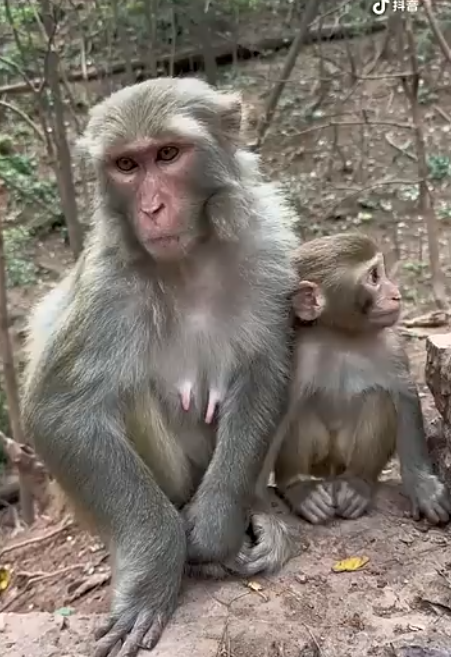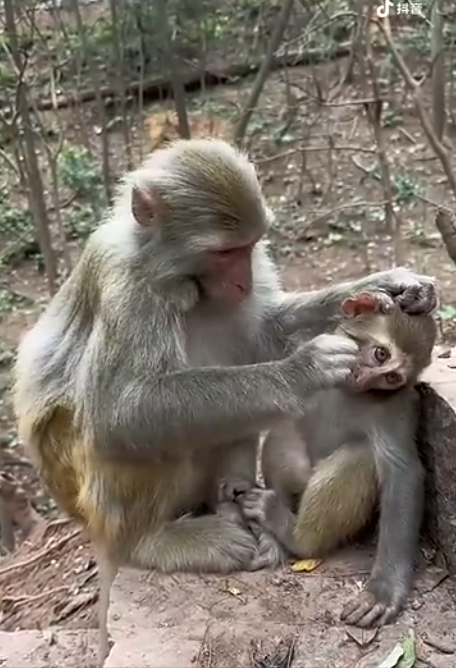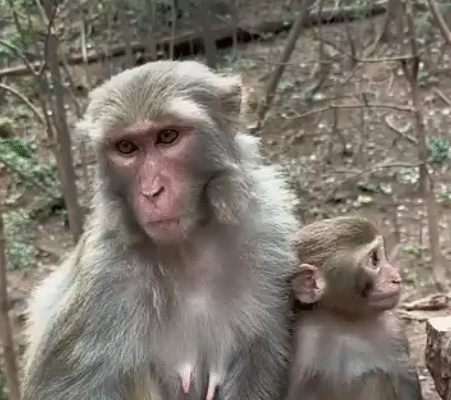
In the heart of a sprawling tropical forest, where sunlight filtered through the dense canopy and the air was filled with the songs of birds and the chatter of wildlife, a small troop of monkeys lived together, thriving in the harmony of nature. Among them was a mother monkey named Suri, known for her striking golden-brown fur and calm, watchful eyes. She had raised her children with care, teaching them the ways of the forest and keeping them safe from predators.
Her youngest, Tiko, had been her constant companion for many months. From the moment he opened his eyes to the world, he had clung to her side, nuzzling against her fur, suckling from her as she provided nourishment and warmth. Suri had watched him grow from a fragile infant into a curious, energetic young monkey who explored every corner of the forest with increasing confidence.
As time passed, Tiko grew older. His small limbs became stronger, his leaps more confident, and his curiosity more insatiable. Yet, despite his size and newfound agility, he continued to rely heavily on his mother’s milk. It was no longer a matter of survival; he was healthy, thriving, and capable of foraging for himself. Yet Tiko still approached Suri for comfort and nourishment, expecting the same care he had received as an infant.
Suri, however, had begun to recognize the delicate balance of nature and growth. She knew that continuing to provide milk for her adult baby could hinder Tiko’s independence. The forest demanded resilience, resourcefulness, and the ability to fend for oneself. She had to make a choice, one that weighed heavily on her heart: it was time for Tiko to stop relying on her completely and to embrace the next stage of life.
At first, Suri tried subtle signals. When Tiko approached her as usual, she would gently nudge him away, offering her affection in the form of grooming rather than nourishment. She would hug him with her arms, nuzzle him softly, and reassure him with quiet gestures that he was safe, but the milk was no longer available. Tiko, confused at first, would squeak and paw at her chest, instinctively searching for the familiar source of comfort.
“Why aren’t you feeding me anymore?” he seemed to ask, his eyes wide and searching. Suri would tilt her head and look at him with gentle firmness, knowing that her actions were necessary. She licked his fur, nuzzled his back, and guided him toward fruit trees and small insects, teaching him how to forage effectively. She wanted him to understand that there were other ways to survive and thrive, and that relying on her forever was not the path nature had intended.

For several days, the forest witnessed a subtle struggle. Tiko followed Suri wherever she went, trying to coax her into giving him milk with tiny whines and playful nudges. He would curl against her, swing around her tail, and even attempt to mimic her grooming gestures in hopes that she would respond in kind. The other young monkeys observed silently, learning from this delicate dance between dependence and independence.
Suri remained patient, never scolding or rejecting him harshly. She understood that the transition would be emotionally challenging, not only for Tiko but for herself. The bond they shared was deep and sacred, built on months of care, protection, and affection. Abstaining from nursing was not a punishment; it was an act of guidance, an encouragement to embrace growth, strength, and self-reliance.
Over time, Tiko began to notice the changes in his mother’s behavior. Instead of receiving milk, he received lessons. Suri showed him which fruits were ripest, how to reach high branches without falling, and which small insects were safe to eat. She taught him to read the signs of the forest—the rustle of leaves that signaled danger, the distant call of other animals that indicated food nearby. Slowly, Tiko began to understand that nourishment came not only from his mother’s milk but also from the world around him.
One afternoon, as sunlight filtered through the canopy, Tiko attempted to climb a particularly tall branch in search of fruit. He wobbled, his small hands gripping tightly, his eyes reflecting a mixture of fear and determination. Suri watched from below, her tail wrapped around a sturdy limb for support, ready to catch him if needed but allowing him to test his own abilities. With a leap and a careful grip, Tiko reached the branch and plucked a fruit, tasting the sweet flesh for the first time without relying on his mother. He squeaked in delight, turning to look at Suri with a mixture of pride and gratitude.
Suri nuzzled him gently, recognizing the triumph. Though Tiko no longer depended on her milk, their bond remained unbroken. She had guided him through a crucial stage of life, teaching him independence while maintaining the love and protection that defined their relationship. Tiko had learned that his mother’s care extended beyond nourishment—that her guidance, support, and presence were just as vital to his growth as milk had once been.
In the days that followed, Tiko’s confidence grew. He no longer approached Suri immediately for milk but instead for comfort, reassurance, or guidance. He explored further, tested new climbing routes, and interacted more boldly with the other monkeys in the troop. Suri observed quietly, proud of his progress. She knew that abstaining from milk had been difficult for both of them, but it had been necessary for Tiko to develop resilience and self-reliance.

The other young monkeys watched closely. Some still nursed from their mothers, but they began to see Tiko as an example of growth. His mother’s decision to abstain from feeding him had shown them that independence was part of life’s natural progression. They learned that love did not always mean providing constant nourishment; sometimes, it meant stepping back, allowing growth, and teaching lessons that could not be learned through milk alone.
By the time Tiko had fully embraced his independence, he had transformed into a strong, capable young monkey. He navigated the forest with skill, foraged successfully, and understood the subtle signals of the environment. Yet, his affection for Suri never waned. He would curl against her at night, nuzzle her cheek, and groom her fur with care, demonstrating a bond that had matured and deepened through the trials of growing up.
Suri, too, had changed. She had experienced the emotional challenge of abstaining from milk, confronting the tension between nurturing and guiding. She had learned that love was not always expressed through immediate gratification, that sometimes the greatest care involved creating opportunities for growth and independence. Her heart swelled with pride each time Tiko demonstrated courage, curiosity, and resilience, knowing that her guidance had prepared him for the challenges of life in the forest.
The forest continued its rhythm, vibrant and alive. Birds sang, rivers flowed, and sunlight filtered through the leaves in golden streams. Amid this natural beauty, the bond between mother and child endured, transformed by experience and growth. Tiko no longer relied on Suri for milk, but he remained deeply connected to her, understanding that her care and guidance would always be part of his life.
In the end, Suri’s choice to abstain from nursing her adult baby monkey was not an act of denial but an act of love. It demonstrated the delicate balance between dependence and independence, teaching Tiko the essential lessons of survival, resilience, and self-reliance. And in doing so, it strengthened their bond, showing that a mother’s love is not measured solely by what she gives, but also by how she empowers her children to grow, explore, and thrive.



